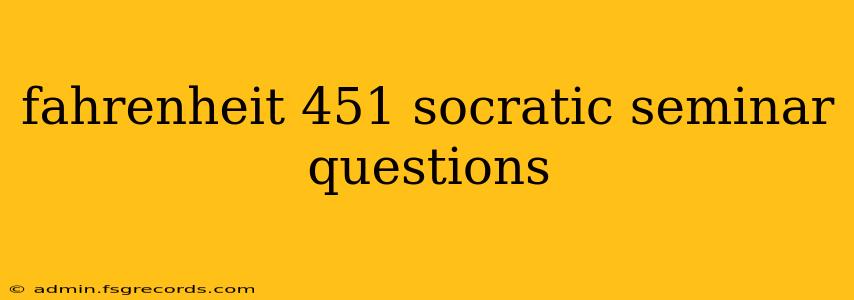Ray Bradbury's Fahrenheit 451 remains a chillingly relevant exploration of censorship, conformity, and the power of knowledge. This Socratic seminar will delve into the novel's complex themes and characters, prompting insightful discussion and critical analysis. These questions are designed to encourage deep thinking and varied perspectives, fostering a rich and engaging conversation.
Part 1: Exploring the Dystopian Society
1. The novel depicts a society where books are outlawed and firemen burn them. What are the parallels between this dystopian society and our own world? Can you identify instances of censorship or suppression of information in contemporary society? This question encourages connections to the present day, making the discussion relevant and impactful.
2. How does Bradbury use imagery and symbolism to create a sense of dystopia? Analyze the significance of the setting, particularly the descriptions of the houses, technology, and the environment. This probes deeper into Bradbury's literary techniques, focusing on how he constructs the dystopian world.
3. The characters in Fahrenheit 451 are largely defined by their relationships to knowledge and technology. Compare and contrast Montag's initial mindset with his transformation throughout the novel. What factors contribute to his change? This focuses on a key character arc, promoting analysis of character development and motivations.
4. Consider the role of technology in shaping the society depicted. How does technology both facilitate and hinder human connection and critical thinking? This prompts discussion on the complex and often contradictory relationship between technology and society.
Part 2: Examining Key Themes and Characters
5. What is the significance of the title, Fahrenheit 451? How does this temperature relate to the themes of the novel? This encourages close reading and interpretation of the title's symbolic meaning.
6. Analyze the different types of societal control employed in the book. How do these methods of control maintain the status quo and suppress dissent? This explores the multifaceted nature of societal control and its effectiveness.
7. Clarisse McClellan is a significant character despite her limited screen time. How does her presence challenge Montag's worldview and contribute to his transformation? This focuses on a minor but influential character and their impact on the protagonist.
8. Discuss the role of nature and the natural world in the novel. How does Bradbury use nature to represent hope, beauty, and resistance to the dystopian system? This analyzes the symbolic use of nature and its contrasting effect to the artificial world.
9. Consider the importance of human connection and the search for meaning in the face of societal oppression. How do characters find solace and support in each other, even in a repressive environment? This addresses the importance of human relationships amidst societal control.
Part 3: Interpreting the Novel's Message
10. What are the central themes of Fahrenheit 451? How does Bradbury use these themes to critique society and warn against the dangers of unchecked power and the suppression of knowledge? This overarching question encourages synthesis of the discussed themes and their significance.
11. Do you believe that the novel's message is still relevant today? Explain your reasoning, providing specific examples from current events or societal trends. This is crucial for making the discussion contemporary and relevant to the participants' lives.
12. What is Bradbury’s ultimate message regarding the importance of books, knowledge, and individual thought? This question pushes for an understanding of the novel's core message and its lasting impact.
These questions serve as a starting point for a rich and engaging Socratic seminar. The discussion should be open-ended, encouraging multiple perspectives and interpretations. Remember to actively listen to your peers and build upon each other's ideas to create a dynamic and thought-provoking conversation.

